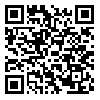Volume 8, Issue 1 (Continuously Updated 2025)
Func Disabil J 2025, 8(1): 0-0 |
Back to browse issues page
Download citation:
BibTeX | RIS | EndNote | Medlars | ProCite | Reference Manager | RefWorks
Send citation to:



BibTeX | RIS | EndNote | Medlars | ProCite | Reference Manager | RefWorks
Send citation to:
Banimahdi R, Akhavan Hejazi S M, Hosseini S A, Akbarfahimi N, Vahedi M. Psychometric Properties of the Persian Version of the Frontal Assessment Battery in Patients With Traumatic Brain Injury. Func Disabil J 2025; 8 (1)
URL: http://fdj.iums.ac.ir/article-1-287-en.html
URL: http://fdj.iums.ac.ir/article-1-287-en.html
Ramin Banimahdi1 

 , Seyed Majid Akhavan Hejazi2
, Seyed Majid Akhavan Hejazi2 

 , Seyed Ali Hosseini3
, Seyed Ali Hosseini3 

 , Nazila Akbarfahimi *4
, Nazila Akbarfahimi *4 

 , Mohsen Vahedi5
, Mohsen Vahedi5 




 , Seyed Majid Akhavan Hejazi2
, Seyed Majid Akhavan Hejazi2 

 , Seyed Ali Hosseini3
, Seyed Ali Hosseini3 

 , Nazila Akbarfahimi *4
, Nazila Akbarfahimi *4 

 , Mohsen Vahedi5
, Mohsen Vahedi5 


1- School of Rehabilitation Sciences, Faculty of Health Sciences, University of Ottawa, Ottawa, Canada.
2- Brain and Spinal Cord Injuries Ward, Rofeideh Rehabilitation Hospital, University of Social Welfare and Rehabilitation Sciences, Tehran, Iran.
3- Department of Occupational Therapy, School of Rehabilitation Sciences, University of Social Welfare and Rehabilitation Sciences, Tehran, Iran.
4- Department of Occupational Therapy, School of Rehabilitation Sciences, University of Social Welfare and Rehabilitation Sciences, Tehran, Iran. ,na.akbarfahimi@uswr.ac.ir
5- Department of Biostatistics and Epidemiology, School of Rehabilitation Sciences, University of Social Welfare and Rehabilitation Sciences, Tehran, Iran.
2- Brain and Spinal Cord Injuries Ward, Rofeideh Rehabilitation Hospital, University of Social Welfare and Rehabilitation Sciences, Tehran, Iran.
3- Department of Occupational Therapy, School of Rehabilitation Sciences, University of Social Welfare and Rehabilitation Sciences, Tehran, Iran.
4- Department of Occupational Therapy, School of Rehabilitation Sciences, University of Social Welfare and Rehabilitation Sciences, Tehran, Iran. ,
5- Department of Biostatistics and Epidemiology, School of Rehabilitation Sciences, University of Social Welfare and Rehabilitation Sciences, Tehran, Iran.
Abstract: (1655 Views)
Background and Objectives: This study aimed to assess the reliability and validity of the Persian frontal assessment battery (P-FAB) in individuals with traumatic brain injury (TBI).
Methods: This cross-sectional and prospective study included 65 patients with TBI (PwTBI) and 65 healthy participants. Concurrent validity was evaluated through comparative analysis with the mini-mental state examination (MMSE), the Wisconsin card sorting test (WCST), and the Stroop color and word test (SCWT). Discriminant validity was analyzed by comparing mean FAB scores between TBI patients and healthy participants. Reliability was assessed through internal consistency, test re-test reliability, and inter-judge reliability. Data were processed using SPSS software, version 22.
Results: FAB scores exhibited no significant relationship with age, gender, or educational background. Significant correlations were identified between FAB scores and those from the MMSE (r=0.791, P<0.001) as well as various measures of executive function (EF). This included the number of categories achieved in the WCST (r=0.745, P<0.001) and perseverative errors (r=0.307, P<0.05) in addition to all items of the Stroop test (P<0.001), with exception of the interference score (P>0.05). The FAB demonstrated good internal consistency (Cronbach’s α: 0.863) and strong test re-test (r=0.882, 95% confidence interval (CI)=0.77–0.95) and inter-rater reliability (r=0.994, 95% confidence interval (CI)=0.77–0.95). A FAB cutoff score 15 yielded optimal sensitivity (0.93) and specificity (0.90) for differentiating TBI patients from healthy controls.
Conclusion: The P-FAB is a valid, reliable, and effective tool for assessing executive dysfunction in PwTBI.
Methods: This cross-sectional and prospective study included 65 patients with TBI (PwTBI) and 65 healthy participants. Concurrent validity was evaluated through comparative analysis with the mini-mental state examination (MMSE), the Wisconsin card sorting test (WCST), and the Stroop color and word test (SCWT). Discriminant validity was analyzed by comparing mean FAB scores between TBI patients and healthy participants. Reliability was assessed through internal consistency, test re-test reliability, and inter-judge reliability. Data were processed using SPSS software, version 22.
Results: FAB scores exhibited no significant relationship with age, gender, or educational background. Significant correlations were identified between FAB scores and those from the MMSE (r=0.791, P<0.001) as well as various measures of executive function (EF). This included the number of categories achieved in the WCST (r=0.745, P<0.001) and perseverative errors (r=0.307, P<0.05) in addition to all items of the Stroop test (P<0.001), with exception of the interference score (P>0.05). The FAB demonstrated good internal consistency (Cronbach’s α: 0.863) and strong test re-test (r=0.882, 95% confidence interval (CI)=0.77–0.95) and inter-rater reliability (r=0.994, 95% confidence interval (CI)=0.77–0.95). A FAB cutoff score 15 yielded optimal sensitivity (0.93) and specificity (0.90) for differentiating TBI patients from healthy controls.
Conclusion: The P-FAB is a valid, reliable, and effective tool for assessing executive dysfunction in PwTBI.
Keywords: Traumatic brain injury (TBI), Frontal assessment battery (FAB), Validity, Reliability, Cut-off
Type of Study: Research |
Subject:
Occupational Therapy
Received: 2024/10/6 | Accepted: 2024/10/20 | Published: 2025/03/22
Received: 2024/10/6 | Accepted: 2024/10/20 | Published: 2025/03/22





